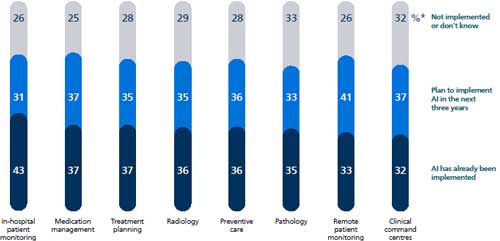News
Healthcare Execs Seek Automation, AI To Fix Biggest Problems: Report
With limited or delayed patient care now endemic, healthcare executives are starting to welcome more widespread use of automation, AI and remote technologies -- albeit with some notable misgivings.
That's according to the ninth annual Future Health Index report by health tech multinational Royal Philips, released this month. Based on survey data from nearly 3,000 healthcare executives across 14 countries, the report determined that the industry is generally unified in its desire to fix what it considers its most pressing concern: a lack of timely access to care.
"[L]ong wait times and staff shortages are making it difficult for people to get the care they need, when they need it," noted the report, available for download here. These factors can result in "delays in screening, diagnosis, treatment and follow-up care," all of which create tangled bottlenecks in patient care that stress healthcare systems even more.
To address these flaws, organizations are increasingly turning to automation, AI and virtual visit technologies.
Automation
Healthcare professionals are stretched thin, with many deciding to leave the industry altogether. Their absence has created staffing shortages, contributed to appointment delays and, particularly in rural and underserved regions, made longer travel distances a necessity for patients seeking care.
Healthcare executives are adopting automation to both reduce burnout and expand patient access to care, the report found. Currently, they're using automation mainly to perform repetitive, administrative tasks like appointment scheduling. However, over the next three years, many plan to adopt automation for other tasks like notetaking, patient triaging, initial medical image screening and equipment maintenance.
The vast majority of the executives Philips surveyed (92 percent) consider automation "critical" for addressing healthcare's staffing problems. On the other hand, they don't seem as certain about automation's welcome; 65 percent of executives see healthcare professionals as being "skeptical" of automation.
Much of that skepticism stems from concerns about how automation might affect the quality of patient care. However, Philips also found that professionals are worried about becoming too reliant on automation, causing them to "lose touch with essential skills and knowledge in their field."
To assuage these worries, Philips recommends organizations focus on employee training and upskilling, using automation only as a support tool.
Remote Care
"[R]emote patient monitoring is here to stay," the Philips researchers found.
Since virtual patient visits became commonplace during the pandemic, healthcare organizations have reported improvements in their ability to provide patient care, help underserved communities, collaborate with other care providers and ease the impact of staff shortages.
The survey's participants reported already using remote care technologies for chronic disease management (50 percent), checking medication adherence (44 percent) and post-operative monitoring (43 percent).
By 2027, they expect that the top use cases will also include telestroke care (40 percent) and maternal and fetal health monitoring (36 percent).
AI
Healthcare providers are struggling with how to synthesize data from multiple, disparate sources into actionable information to help patients.
Fully 94 percent of the survey respondents report having "data integration challenges that impact [their] ability to provide timely, high-quality care." Nearly 40 percent say that gathering patient data eats up time they would normally use actually examining their patients.
The data problems don't stop there; executives also report "increased operational costs due to data inefficiencies and limited coordination between care providers or departments, as well as unnecessary repeat scans and increased risk of errors."
As it is in most industries today, AI has been helping healthcare providers better harness their vast troves of data. Many report already using AI in areas like in-hospital patient monitoring, medication management, treatment planning, radiology
and preventative care.
 Current and planned implementation of AI for clinical decision support. (Source: Royal Philips)
Current and planned implementation of AI for clinical decision support. (Source: Royal Philips)
With providers planning to expand their remote patient visits over the next three years, they also expect to use AI in that area, too.
By and large, it seems healthcare executives see AI use as a foregone conclusion. The majority of them, 85 percent, have either already included AI in their operational budgets or plan to do so.
That's not to say they don't have their qualms, however -- far from it. Nearly nine out of 10 respondents (87 percent) expressed concerns about AI "widening existing disparities in health outcomes." Several also reported being worried about questions of liability if AI systems, for instance, provide "faulty recommendations" that result in patient harm.
To address these concerns, executives said it's necessary to maintain human-in-the-middle approaches to clinical decision making and to require continuous AI training and education for practitioners. On the AI providers' end, the respondents said it's important for them to "make AI more transparent and interpretable for healthcare professionals."